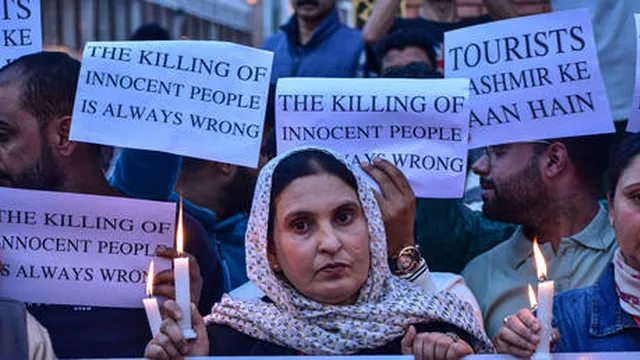
Terrorists kill at least 20 tourists in Kashmir attack
2025-04-25 11:03- On April 23, 2025, gunmen attacked a group of tourists in Pahalgam, Jammu and Kashmir, causing numerous casualties.
- The Indian government has initiated emergency measures for the evacuation of affected tourists and vowed to bring the perpetrators to justice.
- This attack raises concerns about the resurgence of violence against civilians in a region previously experiencing a tourism revival.
Express your sentiment!
Insights
On April 23, 2025, a devastating terrorist attack occurred in Pahalgam, a popular tourist destination in Jammu and Kashmir, India. Authorities confirmed that at least 20 tourists were killed and several others injured when gunmen opened fire indiscriminately at a group of vacationers. The incident shocked the nation and garnered international condemnation, especially given that such assaults targeting tourists are rare in the region. It highlights the ongoing tensions and violence associated with the long-standing insurgency in Kashmir, a territory claimed by both India and Pakistan. In response to the attack, Indian Prime Minister Narendra Modi expressed his outrage and sorrow, calling the act cowardly and vowing that those responsible would face justice. He assured the public that all necessary support was being provided to the victims' families and that measures were being taken to enhance security and prevent future incidents. Likewise, local and national politicians condemned the brutal act and stressed the importance of standing united against terrorism. The aftermath of the Pahalgam attack has led the Indian government to implement emergency measures, including the evacuation of tourists from the area and increased security in popular tourist spots. Additionally, India's Ministry of Civil Aviation announced special flights for injured individuals seeking to return home, emphasizing the government’s commitment to assist affected parties swiftly and adequately. Despite ongoing political tensions with Pakistan, the Indian administration maintained that this violence stemmed from indigenous factors aiming to disrupt peace in the region. As the investigation continues, Indian security forces have launched manhunts to apprehend the attackers. Reports indicate that the motivation behind this assault may stem from a desire to instill fear and disrupt the growing tourism industry in Jammu and Kashmir, which has seen a recovery in recent years following extensive military control and security measures. This incident raises serious questions about the effectiveness of current counter-terrorism strategies and the safety of tourists in a region historically plagued by violence. The call for justice for the victims resonates broadly, and many fear that this attack could signal a grim return to heightened violence in the region.
Contexts
In recent years, the Indian government has faced immense challenges in addressing terrorism, which has impacted the nation's security and stability. The Indian response to terrorism is multi-faceted, involving a combination of legislative measures, military action, intelligence operations, and international cooperation. Following significant terrorist attacks, such as the 2008 Mumbai attacks, the government has implemented stricter security laws and increased funding for security agencies. Key initiatives include the Prevention of Terrorism Act (POTA) and the formation of the National Investigation Agency (NIA), which have been critical in strengthening the legal framework to combat terrorism effectively. These steps are designed to enhance intelligence-sharing mechanisms and streamline the prosecution of terror-related offenses. The government has also prioritized military engagements against terrorist groups operating within and near its borders. The armed forces have been employed in counterinsurgency operations, particularly in regions like Jammu and Kashmir, where separatist movements and terrorism are prevalent. Operations such as surgical strikes have been used to target terrorist launch pads across the Line of Control (LoC) with Pakistan, demonstrating a proactive stance against cross-border terrorism. The intent is to deter future attacks and dismantle the infrastructure supporting terrorist activities. However, these military responses have often led to criticism regarding civilian casualties and the impact on human rights. Intelligence operations play a crucial role in terrorism prevention, with the government investing in advanced surveillance technologies and data analytics to monitor potential threats. The Intelligence Bureau (IB) and other intelligence agencies are increasingly relying on both human and technological intelligence to preempt terrorist activities. Coordination among various state and central agencies has improved, but challenges remain in terms of information sharing and inter-agency collaboration. The emergence of new forms of terrorism and the radicalization of youth through online platforms have added complexity to the already difficult task of intelligence gathering and response. Internationally, India has sought to strengthen its counter-terrorism collaborations, engaging in dialogues with countries worldwide and being a part of various global initiatives. India has consistently advocated for a comprehensive global approach to combating terrorism, emphasizing the need for collective action against the financing of terrorism and the support for terrorist organizations from state and non-state actors. Despite these efforts, the persistent threat of terrorism, compounded by geopolitical tensions in the region, remains a critical challenge for the Indian government. As such, continued vigilance, innovative strategies, and cooperation both domestically and internationally are essential in the ongoing fight against terrorism in India.